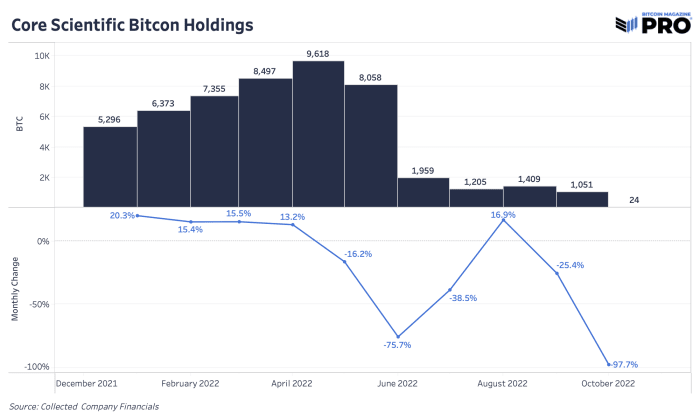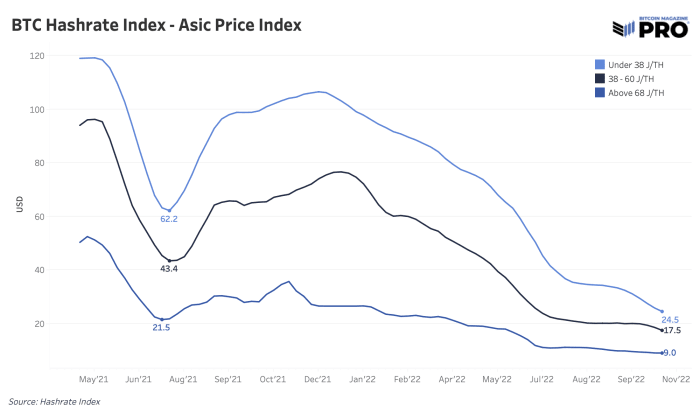The below is an excerpt from a recent edition of Bitcoin Magazine Pro, Bitcoin Magazine’s premium markets newsletter. To be among the first to receive these insights and other on-chain bitcoin market analysis straight to your inbox, subscribe now.
Core Scientific Capitulation
We’ve been highlighting the case for more public miner capitulation over the last few months. News shows that Core Scientific, the largest publicly traded mining company by hash rate and miner fleet, may face bankruptcy. The highlights from their SEC filing are the following:
- Core Scientific is halting all debt service payments.
- Bitcoin holdings are now 24; they sold 1,027 over the last month.
- Cash resources will be depleted by the end of the year or sooner.
- Core Scientific claims Celsius owes them $5.4 million.
A giant in the mining space, holding over 9,600 bitcoin at its peak, Core Scientific has now nearly depleted its entire treasury. Month-over-month growth in holdings is now worse than the summer capitulation and selloff we saw back in June 2022. Yet, in June the selloff was much larger in size (6,099 bitcoin). It’s not necessarily the Core Scientific treasury we are concerned about now but rather the treasuries and holdings of all other bitcoin miners if this is a bigger warning sign for the industry.
Core Scientific was able to drive higher bitcoin production and share of the hash rate by having the largest debt-to-equity ratio in the space at 3.5. Now that debt is coming due during the worst time to try and raise more equity, with depressed prices and lack of financial appetite in the market.
Currently, the company’s liquidity situation is dependent on two variables: the bitcoin price going higher and electricity costs coming down. Our view is that it will be incredibly lucky for either to materialize as a stagnating bitcoin price continues and electricity prices, especially for hosting bitcoin miners, is only trending higher. Looking at Q2 earnings, Core Scientific’s cost of revenues went from 67% to 92% compared to last year. Higher power consumption costs played a significant factor.
The biggest risk associated with mining equities and the rising hash rate is not only if companies can survive and get to the other side; some will and some won’t. Rather, the question you need to ask yourself as an investor is whether your stake in the company will get significantly diluted along the way.
For now, we think broad-based underperformance of miners relative to bitcoin itself can be expected.
Let’s now turn our attention to the potential for a capitulation across the ASIC market, as Core Scientific, the world’s largest publicly traded mining firm by hash rate faces liquidity/solvency worries.
Even without recent developments, ASIC prices were already in fire sale-like territory and are at new all-time lows. Luxor’s Hash Rate Index shows just how depressed prices have become across machine efficiency types in the chart below. As miners have gone to the latest, more efficient rigs, that’s put further downward price pressure on older mining models. As there’s more demand for newer rigs like the S19 XP and other brand new hardware to stay competitive, selling pressure rises for older models that are unviable or unprofitable even with the cheapest energy costs. In the worst case, older machines are just given away for free.
Although Core Scientific will have many options such as debt restructuring, Chapter 11 bankruptcy or a potential merger on the table; selling off and liquidating a part of their 130,000 miner fleet may be another option. Increased selling pressure by miners will only add more strain to depressed prices. Further declines in ASIC prices also impact all miners who are collateralizing or financing their ASICs as the value of ASIC prices can drop further. Now, we await what strain this will have on hash rate over the medium term and if we’re to see a significant falloff in hash rate over the next three to six months. We do not believe this cycle ends without a 20% fall in peak-to-trough hash rate.
Final note: Bitcoin mining is a brutal business, and the current state of these conditions is the last remaining bear to slay in regards to the conclusion of this bear market cycle and the rebirth of the next bull market.
Only the strong will survive.
Relevant Past Articles:

Credit: Source link
























 Bitcoin
Bitcoin  Ethereum
Ethereum  XRP
XRP  Tether
Tether  Solana
Solana  USDC
USDC  Dogecoin
Dogecoin  Cardano
Cardano  Lido Staked Ether
Lido Staked Ether  TRON
TRON  Wrapped Bitcoin
Wrapped Bitcoin  Chainlink
Chainlink  Wrapped stETH
Wrapped stETH  Sui
Sui  Stellar
Stellar  Litecoin
Litecoin  Avalanche
Avalanche  Hedera
Hedera  Shiba Inu
Shiba Inu  LEO Token
LEO Token  Toncoin
Toncoin  USDS
USDS  WETH
WETH  Hyperliquid
Hyperliquid  Polkadot
Polkadot  MANTRA
MANTRA  Bitcoin Cash
Bitcoin Cash  Ethena USDe
Ethena USDe  Bitget Token
Bitget Token  Uniswap
Uniswap  Wrapped eETH
Wrapped eETH  Monero
Monero  NEAR Protocol
NEAR Protocol  Pepe
Pepe  WhiteBIT Coin
WhiteBIT Coin  Aave
Aave  Ondo
Ondo  Bittensor
Bittensor  Aptos
Aptos  Dai
Dai  Mantle
Mantle  Internet Computer
Internet Computer  Official Trump
Official Trump  Ethereum Classic
Ethereum Classic  sUSDS
sUSDS  Tokenize Xchange
Tokenize Xchange  OKB
OKB  Sonic (prev. FTM)
Sonic (prev. FTM)  Gate
Gate 
